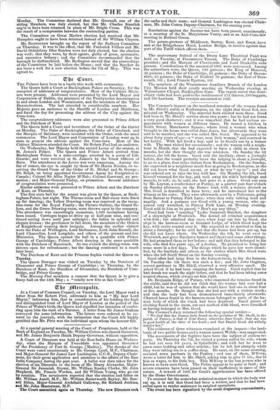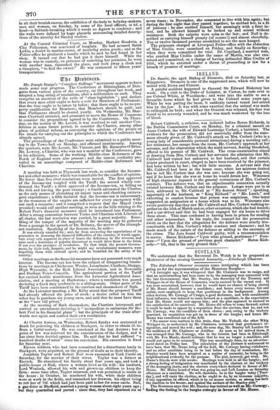Zbe
At a Court of Common Council, on Tuesday, the Lord Mayor read a letter from Sir Robert Peel, addressed to him as "My dear Lord Mayor," informing him, that in consideration of his holding the high and distinguished trust of Lord Mayor of London at the period of the Prince of Wales's birth, the Queen had signified her intention of confer- ring upon him the rank of a Baronet. A letter from Sir James Graham 'conveyed the same information. The letters were ordered to be en- tered on the journals, with the intimation that the Court felt highly gratified that Mr. Pine was the individual upon whom the honour fell.
At a special general meeting of the Court of Proprietors, held at the Bank of England on Tuesday, Mr. William Cotton was elected Governor, and Mr. James Benjamin Heath Deputy-Governor, without opposition.
A Court of Directors was held at the East India House on Wednes- day, when the Marquis of Tweeddale was appointed Governor of the Presidency of Fort St. George, [Madras]. The thanks of the Court were voted unanimously to Mr. George Lyall, M.P., Chairman, and Major-General Sir James Law Lushington, G.C.B., Deputy-Chair- main, for their great application and attention to the affairs of the East India Company during the past year. A ballot was then taken for the election of six Directors in the room of Mr. Henry Alexander, Major- General Sir Jeremiah Bryant, Mr. William Stanley Clarke, Mr. John Shepherd, Mr. Francis Warden, and Sir William Young, who go out by rotation. The scrutineers reported that the election had fallen on Mr. William Astell, M.P., Mr. William Butterworth Bayley, Mr. Rus- sell Ellice, Major-General Archibald Galloway, Sir Richard Jenkins, and Mr. John Masterman, M.P.
The Court assembled again on Thursday. The new Directors took the oaths and their seats ; and General Lashington was elected Chair- man, Mr. John Cotton Deputy-Chairman, for the ensuing year.
Resolutions against the Income-tax have been passed, unanimously, at a meeting of the St. Marylebone Vestry, and at an Anti-Corn-law meeting in Bethnal Green.
The potato-growers of Middlesex, Surrey, Kent, and Essex, have met at the Bridgehouse Hotel, London Bridge, to resolve against that part of the Tariff which affects them.
The anniversary festival of the Drury Lane Theatrical Fund was held on Tuesday, at Freemasons Tavern. The Duke of Cambridge presided ; and the Marquis of Clanricarde and Lord Dunkellin were present. Contributions to the amount of 830/. were announced. Among the subscribers were, the Queen, 100 guineas ; the King of Hanover, 50 guineas ; the Duke of Cambridge, 25 guineas ; the Duke of Devon- shire, 25 guineas; the Duke of Bedford 50 guineas; the Earl of Dart- mouth, 101.; Lord Francis Egerton, 10/.
The members of the Westminster Auxiliary Branch of the London City Mission held their yearly meeting on Wednesday evening, at Westminster Chapel, Buckingham Gate. The report stated that domi- ciliary -visits had been paid to the residences of 174 thieves, 290 beggars, and 190 hawkers. The receipts amounted to 102/.
The Coroner's inquest on the mutilated remains of the woman found in Mr. Shiell's stable at Roehampton, on the night that Good fled, ter- minated on Wednesday. The material facts elicited were these. Good had been in Mr. Shiell's service about two years ; but he had not borne a very good character ; and it was remarked that he had various en- gagements with women at different times. He rented a kitchen in South Street, Manchester Square ; where lived a woman who when brought to the house was called Jane Jones, but afterwards they were said to be married, and she was called Mrs. Good. She appeared to be about forty years of age—a " stout, neat little woman," and reserved in her habits. With her lived a boy, said to be Good's son by a former wife. The man visited her occasionally ; and the woman told a neigh- bour in March, that she had expected to have a child in about sir months, but she then thought she was mistaken. On Sunday the 3d instant, she left the house. Good told the landlady, about a fortnight before, that she would probably leave the lodging in about a fortnight, to go to a place, four miles distant from Roehampton. On the Sunday, she expressed to a neighbour much fear at going to Roehampton, as she did not know what Good meant, or what he was " up to "; and she was ordered not to take the boy with her. On Monday the 4th, Good himself returned for the boy, and took away his wife's bed-things and mangle, to sell; as, he said, she had gone to a place. Good was seen by Mr. Layton, a confectioner at Putney, at a quarter past four o'clock on Sunday afternoon, on the Barnes road, with a woman dressed as Mrs. Good is described to have been ; and he introduced her to the witness as his sister. They were afterwards seen by a Policeman, going from Barnes to Putney Park Lane ; when they were talking loud and angrily. And a postman saw Good with a young woman, who ap- peared very wretched, in Putney Park Lane, on Monday evening. Good said to him as he passed, " Don't say any thing."
Good had been " courting " Lydia Susannah Butcher, the daughter of a shipwright at Woolwich. She denied all criminal acquaintance with him ; but admitted that once, when kept out late by Good, she slept in the harness-room at Granard Lodge, of which Good kept the key, with entire control over it. She expected to be married to him in about a fortnight ; for he told her that the banns had been pat up, but she did not know wheie. On Wednesday the 6th, he went over to Woolwich, and gave Butcher a bonnet and shawl and some other things. He had promised them to her before ; and said that they belonged to his wife, who died five years ago, of a decline. He promised to bring her some more in a few days. The things which he gave her were identi- fied, by the landlady and others, as the clothes which Mrs. Good wore when she left South Street on the Sunday evening.
Good often had large fires in the harness-room, to dry the harness. On Tuesday the 5th there was such a fire ; and Mr. John Oughton, second gardener to Mr. Shiell, observed a very offensive smell. He asked Good if he had been singeing the horses. Good replied that he had drunk too much the night before, and that he had been taking some toasted cheese, which always set him right.
Dr. Benjamin Ridge, of Putney, who examined the remains found in the stable, said that he did not think that the woman had ever had a child, but he was of opinion that she would have had one in about four or five months. He thought that she had met with a violent death ; and that the body had been dismembered immediately afterwards. Charred bones found in the harness-room belonged to parts of the hu- man body of which the trunk had been deprived. Small pieces of clothing found in the room, cut and marked with blood, were identified as having belonged to Mrs. Good.
The Coroner's Jury returned the following special verdict-
" We find that the human body found on the premises of Mr. Shell', in the parish of Putney, is that of Jane Jones, otherwise Jane Good; that she was in good health at the time of her death ; and that Daniel Good did wilfully murder her."
The evidence of three witnesses examined at the inquest—the land- lords of two public-houses and a woman named Welch—was suppressed. The movements of the fugitive have been the subject of endless re- ports. On Thursday the 7th, he visited a person called his wife, whom he had not seen for years, in Spitalfields ; and with her he went to pawn some bedding and other articles ; but he left her abruptly while they were taking tea in a coffee-shop. He next, on the same morning, accosted some paviours in the Poultry ; and one of them, M'Evoy, wrote a letter for him to Mr. Shiell, asking him to give 71. 108., due to him as wages, to his little boy. This M`Evoy is the last person who is known to have seen Good. The Police appear to be quite at fault ; and severe censures have been passed on their inefficiency in cases of this nature. A reward of 1001. for Good's apprehension has been offered by the Home Government. To account for the somewhat artistical manner in which the body was cut up, it is said that Good had been a soldier, and that he had been called upon to render assistance in surgical operations:
The evens hae been fisualixed by the usual disitualmg concomitants, in all their brutish excess, the exhibition of the body to holyday-makers, men and women, on Sunday, by some of the local officers, at 64. a head—a Sabbath-breaking which it needs no Agnew to condemn ; and the walls were defaced by huge placards announcing detailed descrip- tions of the atrocity for Sunday readers.
At the Central Criminal Court, on Monday, Herbert Goodwin a City Policeman, was convicted of burglary. He had accused Sarah Lewis, a dealer in marine-stores, of receiving stolen goods; and at the Police-office he produced a bundle which be said he had found in her shop. It turned out that he had put it there himself. While the woman was in custody, on pretence of searching her premises, he went with another man, ransacked the place, and took away a cloak and a timepiece, "to find the owner." He was sentenced to fifteen years' transportation.

























 Previous page
Previous page